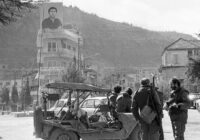Increased international backing and military resources for Haftar could lead to a more aggressive push by the general for broader power in Libya.
Since the beginning of 2017, there have been increasing signs that key states in the international community may be willing to acquiesce to the renegade General Khalifa Haftar assuming a more central role in the Libyan government. Alongside clear support for Haftar from Vladimir Putin’s Russia, these developments raise questions about the extent to which the general may be able to further entrench his power within Libya.
Since the outbreak of civil conflict in Libya in 2014, Haftar has been a key actor on the country’s political landscape as a powerful militia commander. In May 2014, he launched a war against Libyan Islamist groups known as “Operation Dignity,” and a year later was appointed leader of the Libyan National Army (LNA) by the Tobruk-based parliament, the House of Representatives (HOR).
Haftar has so far refused to comply with the December 2015 Skhirat agreement, which nominally established a Tripoli-based Libyan unity government—a central authority known as the Government of National Accord (GNA). Instead, he appears to have been emboldened by his success against Islamists to hold out for a more powerful national role for himself as Libya’s most senior military leader.
Western states attempting to strengthen Libya’s unity government have generally been skeptical of a constitutional role for Haftar, due to his lack of willingness to recognize the GNA and his antagonizing of other political actors in the country. However, the failure so far of the GNA to consolidate its nationwide authority, alongside Haftar’s military effectiveness, is convincing more government figures in Europe that engagement with Haftar may be necessary if security in North Africa is to be attained.
THE EU MIGRANT CRISIS
A crucial factor likely to influence opinion in the European Union (EU) is southern Europe’s long-running migrant crisis. In 2016, more than 181,000 migrants and refugees—an 18% increase over the previous year—successfully crossed the Mediterranean to reach Italy, and it is expected that the issue may be of a similar scale over the coming year. The EU recently announced a $212 million program for combating human trafficking in North Africa, with Libya being recognized as the key launching point for migrant boats attempting to reach Europe.
However, the absence of effective partnership with the Tripoli-based GNA authorities means that many EU officials see this effort as likely to have a limited impact. The GNA continues to have very limited control over much of the country more than a year after the Skhirat agreement, particularly in the vast southern regions that are used as routes by traffickers.
As one of the European countries receiving the largest volumes of migrants, Italy has been at the forefront of voices within the EU calling for increased recognition of Haftar. At a recent meeting of EU foreign policy officials, the Italian foreign affairs and security chief Federica Mogherini advocated greater “flexibility” in EU policy toward the general, with the possible lifting of sanctions against opponents of the GNA being suggested. Accepting a more central role for Haftar is increasingly seen as the more “pragmatic” solution for Libya, and it is likely that Italian lawmakers will be encouraging other EU partners to make similar policy shifts over the coming months.
In addition to those in Italy, other figures within EU governments are also beginning to recognize the necessity of dealing with Haftar. British Foreign Secretary Boris Johnson recently told media that he wanted to persuade the general to “play a big role in Libya.” British Conservative Member of Parliament Kwasi Kwarteng also highlighted his view that “the GNA solution isn’t working and we still have a massive humanitarian crisis,” and advocated some kind of “transition” arrangement to reduce human trafficking numbers.
RUSSIAN TIES IN NORTH AFRICA
A notable influence against the backdrop of the debate within the EU is the increasing overtures by the Russian government toward a greater level of backing for Haftar. The Libyan general visited Moscow twice in the latter half of 2016, in order to request military support for his ongoing battles against Islamist militants in Benghazi. In January 2017, Haftar then held a meeting with Russian Defense Minister Sergei Shoigu, after ostentatiously boarding a Russian aircraft returning from an active role in Syria’s conflict. January’s meeting came two weeks before an announcement by Haftar that he had finally driven Islamist militants from most of their strongholds in Benghazi, with much of the city in ruins after years of heavy fighting.
Haftar’s standing has also been bolstered by a successful military operation by his forces in September 2016, which led to the seizure and gradual reopening of key oil ports and fields in central Libya that had been subject to a blockade since 2014.
Despite reported efforts by EU diplomats to dissuade the Russian government from enabling Haftar to expand his power in Libya, it is becoming clear that Russia views the general as a preferred regional ally. Russia is widely recognized to have been encouraged by the effectiveness of its intervention in Syria since 2015, and likely wants to add Haftar to an emerging axis of allied regional strongmen, including Syria’s Bashar al-Assad and Egypt’s Abdel Fatah al-Sisi.
 Another aspect of Haftar’s appeal to Russia is that he has until now been persistent in his opposition to the GNA, which is seen as a potentially important element of the West’s network of alliances in the Middle East and North Africa. It is likely that EU states are now realizing that growth in Haftar’s power is highly probable, and that it would not be advantageous to confine the general to Russia’s sphere of influence.
Another aspect of Haftar’s appeal to Russia is that he has until now been persistent in his opposition to the GNA, which is seen as a potentially important element of the West’s network of alliances in the Middle East and North Africa. It is likely that EU states are now realizing that growth in Haftar’s power is highly probable, and that it would not be advantageous to confine the general to Russia’s sphere of influence.
Despite the prospect of Haftar gaining increased military aid and crucial foreign backing, opposition to the LNA remains strong among Libya’s other domestic armed factions. Opposition is particularly vigorous among the country’s Misrata-based militias and tribes, which are partly made up of Islamist fighters and which have clashed with LNA forces on several occasions since 2014.
This situation means the idea that Haftar could seize overall military power in Libya, as some observers have suggested, is highly problematic. There is a strong possibility that an increased push for control in Libya by the general, emboldened by new resources and alliances, could lead to heightened resistance against the LNA and wider civil conflict in the country. Furthermore, divisions among current GNA adherents regarding a key role for Haftar could easily lead to fragmentation of the unity government, and an aggravation of the GNA’s military factionalism.
As of yet, it is unclear whether Haftar will from now compromise with the GNA in accepting a more prominent formal role within its structures, or whether he plans to seriously pursue ambitions for a broader degree of power.
*[This article is based on a report by Protection Group International.]
The views expressed in this article are the author’s own and do not necessarily reflect Fair Observer’s editorial policy.
Photo Credit: Karim Mostafa
Support Fair Observer
We rely on your support for our independence, diversity and quality.
For more than 10 years, Fair Observer has been free, fair and independent. No billionaire owns us, no advertisers control us. We are a reader-supported nonprofit. Unlike many other publications, we keep our content free for readers regardless of where they live or whether they can afford to pay. We have no paywalls and no ads.
In the post-truth era of fake news, echo chambers and filter bubbles, we publish a plurality of perspectives from around the world. Anyone can publish with us, but everyone goes through a rigorous editorial process. So, you get fact-checked, well-reasoned content instead of noise.
We publish 2,500+ voices from 90+ countries. We also conduct education and training programs
on subjects ranging from digital media and journalism to writing and critical thinking. This
doesn’t come cheap. Servers, editors, trainers and web developers cost
money.
Please consider supporting us on a regular basis as a recurring donor or a
sustaining member.
Will you support FO’s journalism?
We rely on your support for our independence, diversity and quality.






